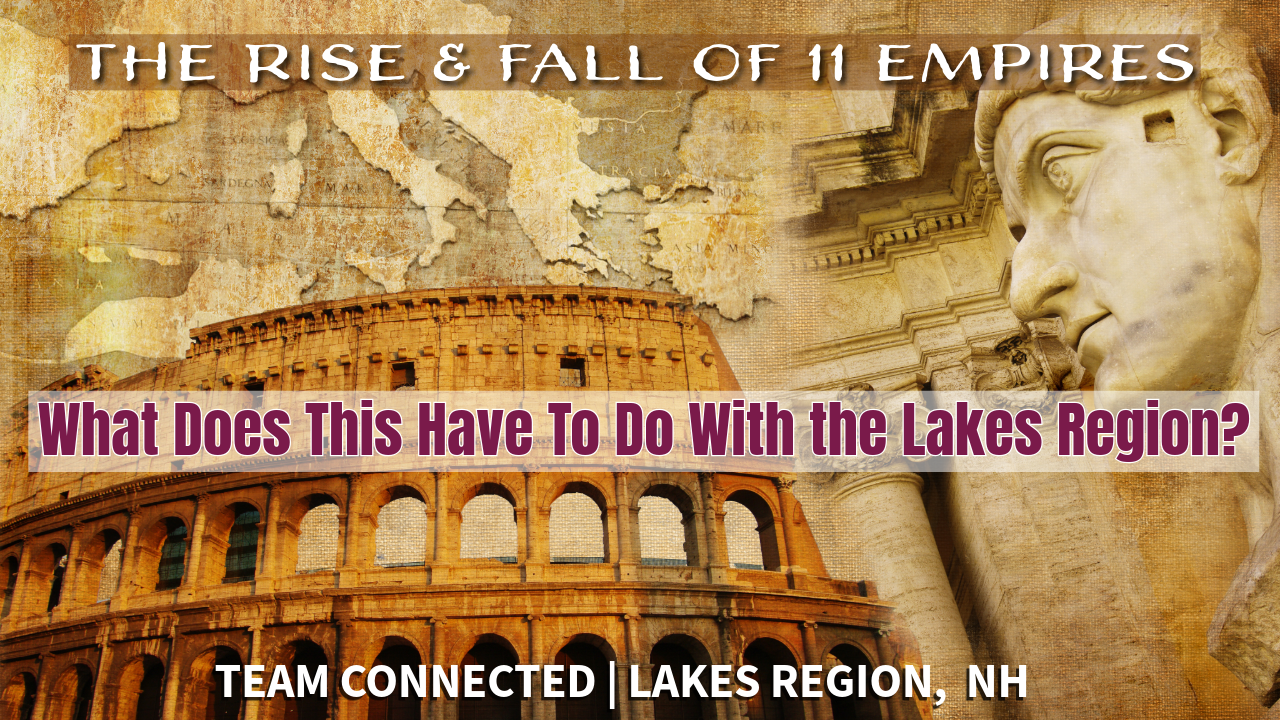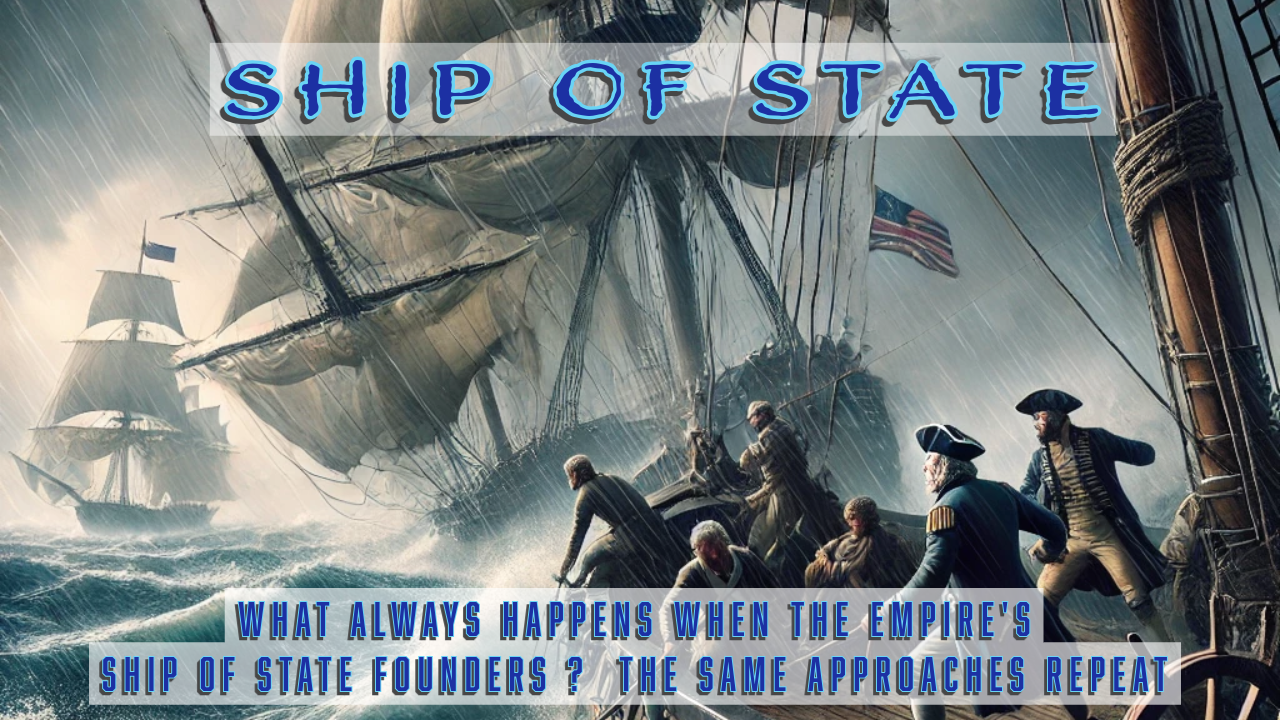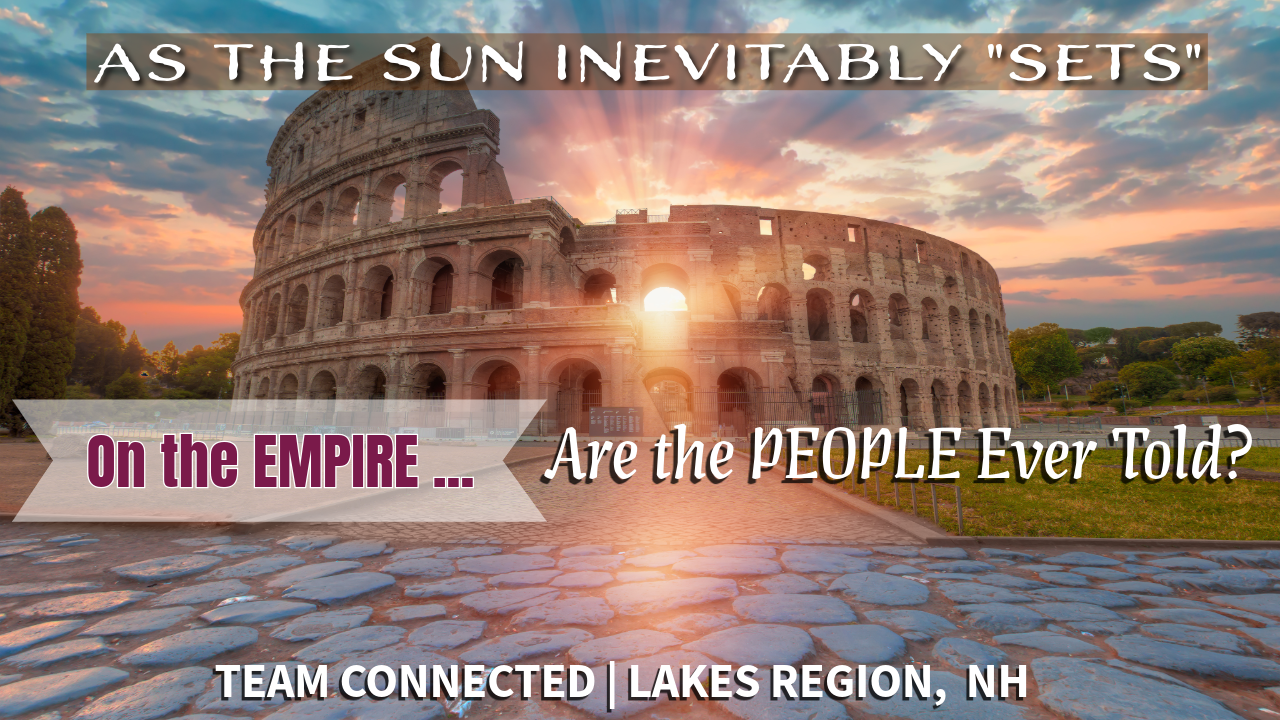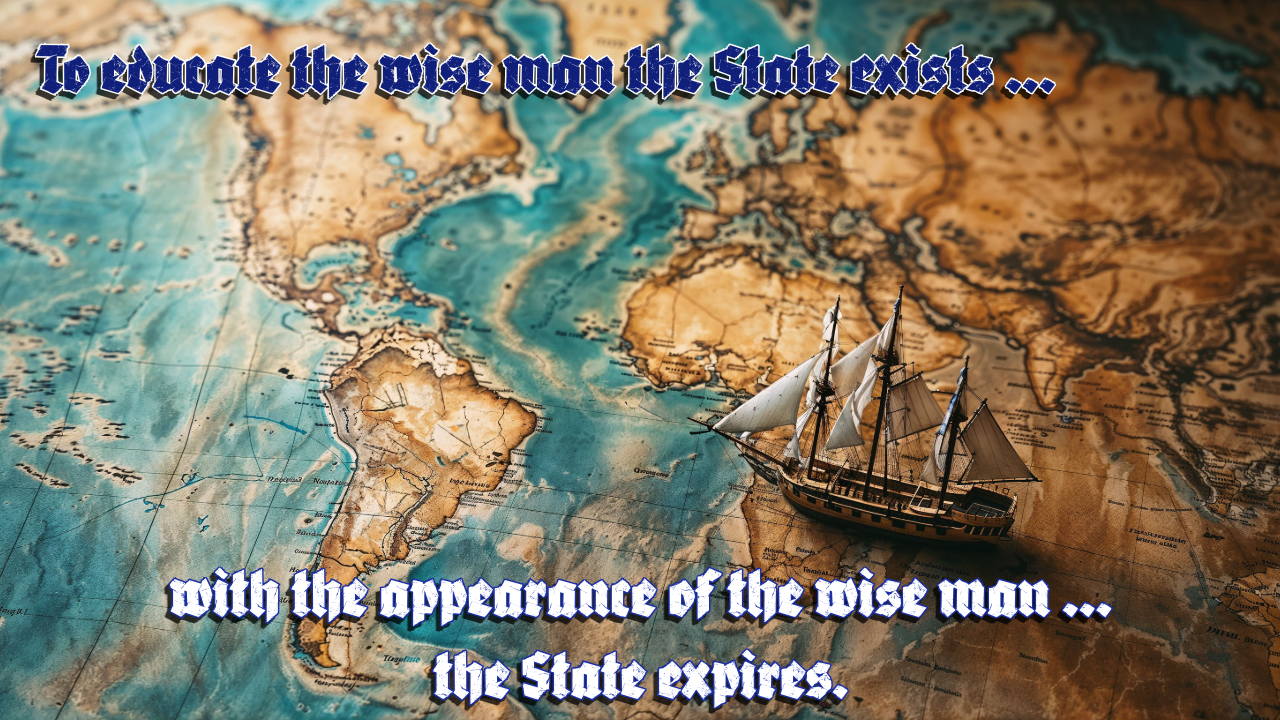What do the Rise and Fall of 11 Previous Empires have to do with the Lakes Region? Turns out — Quite a Bit.
What do the Rise and Fall of 11 Previous Empires have to do with the Lakes Region? Turns out — Quite a Bit.
This Blog Post is a follow up to another recent post entitled: “What Does the American History of HOUSELESSNESS Have to Do With Anything in the Lakes Region?” (09.13,2025) [See also a summarized review of that post by a local Lakes Region NH Realtor: “Housing History on Repeat” by Vanessa Saunders (09.13.2025).
“The only thing we learn from history,’ it has been said, ‘is that men never learn from history’, a sweeping generalisation perhaps, but one which the chaos in the world today goes far to confirm. What then can be the reason why, in a society which claims to probe every problem, the bases of history are still so completely unknown?”
As we pass through life, we learn by experience. We look back on our behaviour when we were young and think how foolish we were. In the same way our family, our community and our town endeavour to avoid the mistakes made by our predecessors.
The experiences of the human race have been recorded, in more or less detail, for some four thousand years. If we attempt to study such a period of time in as many countries as possible, we seem to discover the same patterns constantly repeated under widely differing conditions of climate, culture and religion. Surely, we ask ourselves, if we studied calmly and impartially the history of human institutions and development over these four thousand years, should we not reach conclusions which would assist to solve our problems today? For everything that is occurring around us has happened again and again before. — Sir John Glubb (circa 1970’s) Lengthy WIKIPEDIA Entry.
Introduction:
There are four parts to this post:
The existence and same fate of 11 empires for 4000+ years through 2025;
Striking similarities of every empire;
Signals of the fall of every empire;
Is there another way to approach this? Yes!
And we begin Part 1 with a discussion of an essay entitled: “THE FATE OF EMPIRES and SEARCH FOR SURVIVAL” by Sir John Glubb. A short video explaining the significance of this essay appears beneath the following background on Sir Glubb.
John Bagot Glubb was born in 1897, his father being a regular officer in the Royal Engineers. At the age of four he left England for Mauritius, where his father was posted for a three-year tour of duty. At the age of ten he was sent to school for a year in Switzerland. These youthful travels may have opened his mind to the outside world at an early age. He entered the Royal Military Academy at Woolwich in September 1914, and was commissioned in the Royal Engineers in April 1915. He served throughout the first World War in France and Belgium, being wounded three times and awarded the Military Cross. In 1920 he volunteered for service in Iraq, as a regular officer, but in 1926 resigned his commission and accepted an administrative post under the Iraq Government. In 1930, however, he signed a contract to serve the Transjordan Government (now Jordan). From 1939 to 1956 he commanded the famous Jordan Arab Legion, which was in reality the Jordan Army. Since his retirement he has published seventeen books, chiefly on the Middle East, and has lectured widely in Britain, the United States and Europe.
Striking similarities of every Empire | Every Ship of State
WHY is Plato’s “Ship of State” essay Relevant?
“… Imagine then a fleet or a ship in which there is a captain who is taller and stronger than any of the crew, but he is a little deaf and has a similar infirmity in sight, and his knowledge of navigation is not much better. The sailors are quarrelling with one another about the steering—everyone is of opinion that he has a right to steer, though he has never learned the art of navigation and cannot tell who taught him or when he learned, and will further assert that it cannot be taught, and they are ready to cut in pieces anyone who says the contrary. They throng about the captain, begging and praying him to commit the helm to them; and if at any time they do not prevail, but others are preferred to them, they kill the others or throw them overboard, and having first chained up the noble captain’s senses with drink or some narcotic drug, they mutiny and take possession of the ship and make free with the stores; thus, eating and drinking, they proceed on their voyage in such manner as might be expected of them. Him who is their partisan and cleverly aids them in their plot for getting the ship out of the captain’s hands into their own whether by force or persuasion, they compliment with the name of sailor, pilot, able seaman, and abuse the other sort of man, whom they call a good-for-nothing; but that the true pilot must pay attention to the year and seasons and sky and stars and winds, and whatever else belongs to his art, if he intends to be really qualified for the command of a ship, and that he must and will be the steerer, whether other people like or not the possibility of this union of authority with the steerer’s art has never seriously entered into their thoughts or been made part of their calling. Now in vessels which are in a state of mutiny and by sailors who are mutineers, how will the true pilot be regarded? Will he not be called by them a prater, a star-gazer, a good-for-nothing?” — Plato, The Republic, Book VI (The Philosophy of Government) https://en.wikipedia.org/wiki/Ship_of_State
Are there Common Signals of the fall of every Empire?
One well-written answer to the question of signals — appeared in a book published in the late 1990’s entitles: The Sovereign Individual: How to survive and thrive during the collapse of the welfare state is a 1997[a] as a non-fiction book by William Rees-Mogg and James Dale Davidson. Later republished on 26 August 1999 by Touchstone with the new subtitle Mastering the Transition to the Information Age. It forecasts the development of the twenty-first century; focusing on the rise of the internet and cyberspace, digital currency and digital economy, self-ownership and decentralization from the State. SOURCE
William Rees-Mogg, Baron Rees-Mogg (14 July 1928 – 29 December 2012) was a British newspaper journalist who was Editor of The Times from 1967 to 1981. In the late 1970s, he served as High Sheriff of Somerset, and in the 1980s was Chairman of the Arts Council of Great Britain and Vice-Chairman of the BBC's Board of Governors. He was the father of the politicians Jacob and Annunziata Rees-Mogg. SOURCE
James Dale Davidson is an American private investor and investment writer, co-writer of the newsletter Strategic Investment,[1] and co-author with William Rees-Mogg of Blood in the Streets: Investment Profits in a World Gone Mad(1987),[2] The Great Reckoning (1991),[1][3][4] and The Sovereign Individual (1997). He wrote The Plague of the Black Debt - How to Survive the Coming Depression in 1993 in which he predicted that as part of a "deep depression... Clinton is going to be a one-term president ... I am as sure of this as I am that the sun will rise tomorrow" and that the US national debt would increase by a trillion dollars during Clinton's "one-term" presidency. He further wrote in the book that Boris Yeltsin, President of the Russian Federation, would lose his job and that Russia will come under the control of a nationalist, militarist regime. He has been credited with predicting the U.S. subprime mortgage crisis, though much earlier than it actually occurred. SOURCE
The following excerpts from The Sovereign Individual present recurring themes and observations of Empires in our discussion amid the technology and information age::
“… Like an angry farmer, the state will no doubt take desperate measures at first to tether and hobble its escaping herd. It will employ covert and even violent means to restrict access to liberating technologies. Such expedients will work only temporarily, if at all. The twentieth century nation state, with all its pretensions, will starve to death as its tax revenues decline.
When the state finds itself unable to meet its committed expenditure by raising tax revenues, it will resort to other, more desperate measures. Among them is printing money. Governments have grown used to enjoying a monopoly over currency that they could depreciate at will.
This arbitrary inflation has been a prominent feature of the monetary policy of all twentieth century states. Even the best national currency of the postwar period, the German mark, lost 71 percent of its value from January 1, 1949, through the end of June 1995. In the same period, the U.S. dollar lost 84 percent of its value.6
This inflation had the same effect as a tax on all who hold the currency. As we explore later, inflation as revenue option will be largely foreclosed by the emergence of cybermoney. New technologies will allow the holders of wealth to bypass the national monopolies that have issued and regulated money in the modern period. The state will continue to control the industrial-era printing presses, but their importance for controlling the world's wealth will be transcended by mathematical algorithms that have no physical existence. In the new millennium, cybermoney controlled by private markets will supersede flat money issued by governments. Only the poor will be victims of inflation. …”
This is true for almost unavoidable reasons. The more apparent it is that a system is nearing an end, the more reluctant people will be to adhere to its laws. Any social organization will therefore tend to discourage or play down analyses that anticipate its demise. This alone helps ensure that history's great transitions are seldom spotted as they happen. If you know nothing else about the future, you can rest assured that dramatic changes will be neither welcomed nor advertised by conventional thinkers.
You cannot depend upon conventional information sources to give you an objective and timely warning about how the world is changing and why. If you wish to understand the great transition now under way, you have little choice but to figure it out for yourself.
Beyond the Obvious
This means looking beyond the obvious. The record shows that even transitions that are undeniably real in retrospect may not be acknowledged for decades or even centuries after they happen. Consider the fall of Rome. It was probably the most important historic development in the first millennium of the Christian era. Yet long after Rome's demise, the fiction that it survived was held out to public view, like Lenin's embalmed corpse. No one who depended upon the pretenses of officials for his understanding of the "news" would have learned that Rome had fallen until long after that information ceased to matter.
The reason was not merely the inadequacy of communications in the ancient world. The outcome would have been much the same had CNN miraculously been in business, running its videotape in September [AD] 476. That is when the last Roman emperor in the West, Romulus Augustulus, was captured in Ravenna and forcibly retired to a villa in Campania on a pension. Even if Wolfe Blitzer had been there with minicams recording the news in [AD] 476, it is unlikely that he or anyone else would have dared to characterize those events as marking the end of the Roman Empire. That, of course, is exactly what latter historians said happened. CNN editors probably would not have approved a headline story saying "Rome fell this evening." The powers-that-be denied that Rome had fallen. Peddlers of "news" seldom are partisans of controversy in ways that would undermine their own profits.
They may be partisan. They may even be outrageously so. But they seldom report conclusions that would convince subscribers to cancel their subscriptions and head for the hills. Which is why few would have reported the fall of Rome even if it had been technologically possible. Experts would have come forth to say that it was ridiculous to speak of Rome falling. To have said otherwise would have been bad for business and, perhaps, bad for the health of those doing the reporting. The powers in late-fifth- century Rome were barbarians, and they denied that Rome had fallen.
But it was not merely a case of authorities' saying, "Don't report this or we will kill you." Part of the problem was that Rome was already so degenerate by the later decades of the fifth century that its "fall" genuinely eluded the notice of most people who lived through it. In fact, it was a generation later before Count Marcellinus first suggested that "The Western Roman Empire perished with this Augustulus."6 Many more decades passed, perhaps centuries, before there was a common acknowledgment that the Roman Empire in the West no longer existed. Certainly Charlemagne believed that he was a legitimate Roman emperor in the year 800.
The point is not that Charlemagne and all who thought in conventional terms about the Roman Empire after 476 were fools. To the contrary. The characterization of social developments is frequently ambiguous. When the power of predominant institutions is brought into the bargain to reinforce a convenient conclusion, even one based largely on pretense, only someone of strong character and strong opinions would dare contradict it. If you try to put yourself in the position of a Roman of the late fifth century, it is easy to imagine how tempting it would have been to conclude that nothing had changed. That certainty was the optimistic conclusion. To have thought otherwise might have been frightening. And why come to a frightening conclusion when a reassuring one was at hand?
After all, a case could have been made that business would continue as usual. It had in the past. The Roman army, and particularly the frontier garrisons, had been barbarized for centuries.7 By the third century, it had become regular practice for the army to proclaim a new emperor. By the fourth century, even officers were Germanized and frequently illiterate.8 There had been many violent overthrows of emperors before Romulus Augustulus was removed from the throne. His departure might have seemed no different to his contemporaries than many other upheavals in a chaotic time. And he was sent packing with a pension. The very fact that he received a pension, even for a brief period before he was murdered, was a reassurance that the system survived. To an optimist, Odoacer, who deposed Romulus Augustulus, reunified rather than destroyed the empire. A son of Attila's sidekick Edecon, Odoacer was a clever man. He did not proclaim himself emperor. Instead, he convened the Senate and prevailed upon its too-suggestible members that they offer the emperorship and thus sovereignty over the whole empire to Zeno, the Eastern emperor in faraway Byzantium. Odoacer was merely to be Zeno's patricius to govern Italy.
As Will Durant wrote in The Story of Civilization, these changes did not appear to be the "fall of Rome" but merely "negligible shifts on the surface of the national scene." 7 When Rome fell, Odoacer said that Rome endured. He, along with almost everyone else, was keen to pretend that nothing had changed. They knew that "the glory that was Rome" was far better than the barbarism that was taking its place. Even the barbarians thought so. As C. W. Previte-Orton wrote in The Shorter Cambridge Medieval History, 6 Ibid., p. 102.7 See S. A. Cook et al., eds., The Cambridge Ancient History, vol.12 (Cambridge:Cambridge University Press, 1971), pp. 208-22. 8 Ibid., pp. 209-20. … the end of the fifth century, when "the Emperors had been replaced by barbaric German kings," was a time of "persistent make-believe."
"Persistent make-believe"
This "make-believe" involved the preservation of the facade of the old system, even as its essence was "deformed by barbarism."9 The old forms of government remained the same when the last emperor was replaced by a barbarian "lieutenant." The Senate still met. "The praetorian prefecture and other high offices continued, and were held by eminent Romans." Consuls were still nominated for a year "The Roman civil administration survived intact." Indeed, in some ways it remained intact until the birth of feudalism at the end of the tenth century. On public occasions, the old imperial insignia was still employed. Christianity was still the state religion. The barbarians still pretended to owe fealty to the Eastern emperor in Constantinople, and to the traditions of Roman law. In fact, in Durant's words, "in the West the great Empire was no more."
So What?
The faraway example of the fall of Rome is relevant for a number of reasons as you contemplate conditions in the world today. Most books about the future are really books about the present. We have sought to remedy that defect by making this book about the future first of all a book about the past. We think that you are likely to draw a better perspective about what the future has in store if we illustrate important megapolitical points about the logic of violence with real examples from the past.
History is an amazing teacher. The stories it has to tell are more interesting than any we could make up. And many of the more interesting relate to the fall of Rome. They document important lessons that could be relevant to your future in the Information Age. …”
All Empires Rise and Thrive on “Separation Identity” | Divisions, Clubs, Cults of “Us vs. Them”
Ok you might say, but how do we look at right now … in 2025. In light of the recurring past of these 11 Empires, how can we sift through the barrage of information we scroll through every day? That is a highly relevant and understandable question. This short video by Chase Hughes who publishes a podcast regularly on that very subject — is one of many sources — highly trained on that subject:
His description begins: “… but before the truth is even clear, the disinformation machine is already spinning. This video exposes how suppression, radicalization, and division are weaponized—not by ideology, but by systems designed to keep you outraged, divided, and distracted.
We’ll reveal:
• Why suppression is the biggest red flag in history—and why it always signals weakness, not strength.
• How highly suggestible people are radicalized—not by one side or the other, but through media outrage loops, algorithmic echo chambers, and deliberate manipulation.
• The illusion of “left vs. right”—a distraction designed to pit neighbors against each other while corruption, corporate power, and elites escape untouched.
• The common ground we all share: freedom, safety, stability, fairness—and what none of us want: corruption, endless wars for profit, elites with different rules, surveillance states, and justice systems that bend for the powerful but break for the rest of us.
This is not a partisan message.
Suppression is weakness.
Radicalization is manipulation.
Disinformation is the bait.
And if you don’t understand how this machinery works, you’ll keep falling for it.
Is there another way to approach this? Yes!
In the 1900’s Emerson wrote two insightful essays on this question: What can we do? His perspective is food for Critical Thinking:
Politics
“In dealing with the State, we ought to remember that its institution are not aboriginal, though they existed before we were born: that they are not superior to the citizen: that every one of them was once the act of a single man: every law and usage was a man's expedient to meet a particular case: that they all are imitable, all alterable; we may make as good; we may make better. Society is an illusion to the young citizen.
To educate the wise man, the State exists; and with the appearance of the wise man, the State expires. The appearance of character makes the State unnecessary. The wise man is the State. He needs no army, fort, or navy, — he loves men too well; no bribe, or feast, or palace, to draw friends to him; no vantage ground, no favorable circumstance. He needs no library, for he has not done thinking; no church, for he is a prophet; no statute book, for he has the lawgiver; no money, for he is value; no road, for he is at home where he is; no experience, for the life of the creator shoots through him, and looks from his eyes. He has no personal friends, for he who has the spell to draw the prayer and piety of all men unto him, needs not husband and educate a few, to share with him a select and poetic life. His relation to men is angelic; his memory is myrrh to them; his presence, frankincense and flowers.”
Essay Experience
The physicians say, they are not materialists; but they are: — Spirit is matter reduced to an extreme thinness: O so thin! — But the definition of spiritual should be, that which is its own evidence. What notions do they attach to love! what to religion! One would not willingly pronounce these words in their hearing, and give them the occasion to profane them.
I carry the keys of my castle in my hand, ready to throw them at the feet of my lord, whenever and in what disguise soever he shall appear. I know he is in the neighborhood hidden among vagabonds.
And one last video addressing Empires — one used by TEAM CONNECTED in individual and small group WORKSHOPS.

















